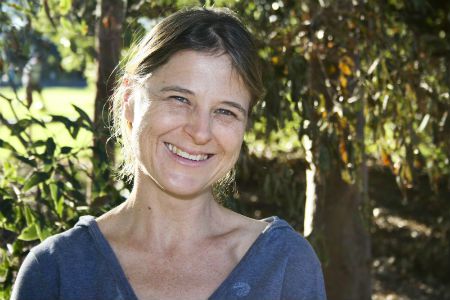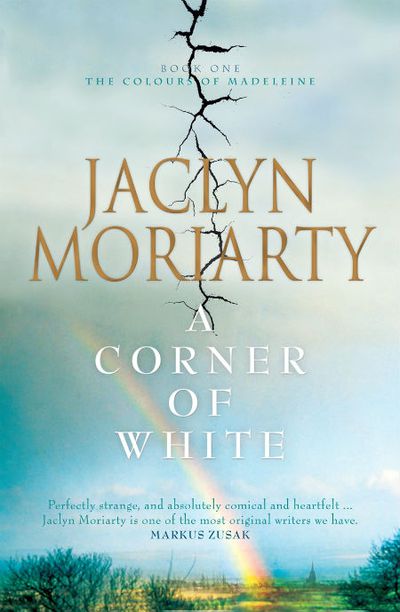Some books defy neat categories. Jaclyn Moriarty tells us the story behind her new novel,

There’s a guy who writes for the New York Times and a few months back he said that he would never read a ‘young adult’ book. Or only once he’d finished the last 3,000 years of fiction for adults. Which I suppose he might do. If he’s a super-fast reader. And diligent. ( If you’re interested you can read that article here. )
Earlier this year, my little boy started school. These days, every time we pass his old pre-school, he says: ‘I hate that place.’ He loved preschool! He still misses the teachers! He still plans to marry half the kids from the class! But each time we pass, ‘I hate it,’ he insists. ‘It’s a baby place.’ And he shudders and picks up his pace.
I guess it’s part of growing-up: until we’re sure of who we are, we panic that we might slip back into what we used to be. When I first heard about that New York Times article, I wondered if the writer was one of those people who hasn’t quite got over the panic. But then I read the article and in fact he’s making a good point. Much of today’s entertainment is so infantile and mindless: at least when we read, we should try to use our brains.
There was a stampede of responses to the article, mostly along these lines:
You idiot! You’re going to miss some of the greatest books ever written while you waste your time on trash!!
(I especially liked Patricia McCormick’s response here.)
The mistake is the dismissal of an entire genre. Of course, there are infantile, mindless YA books, just as there are terrible adult books, but there are also YA (and children’s) books that are astonishing. A related issue is classification. Who says what’s YA fiction and what’s adult? Keeping in mind that ‘young adulthood’ itself is a relatively recent invention, and YA fiction even more so.
I’ve been thinking about the classification issue lately. My latest book, A Corner of White, is set partly in an imaginary kingdom called Cello, and partly in the real world. I usually write for young adults but when I started this, I thought it should be a children’s book. Kingdoms seemed purpose-built for children.
My opening pages went nowhere. I kept giving up and starting again, and giving up and starting again, until one day I realised that the problem was with my characters. They were too young for me. I decided to make them into teenagers. Right away they became more complex, interesting and edgy. New plot directions and themes unfolded. All right, I decided, I’ve written another young adult book.
My Australian publishers read it, and said this might actually be an adult book. I thought calling it that might exclude young readers. And that adult readers would feel duped.
‘Hang on a minute,’ they might say. ‘There are teenagers in this book! It’s a BABY book!’ and they’d shudder and run away. In the end my publishers said: Why does it have to be one thing or another? An adult book, a teen book, a cross-over book?‘
'It’s a book,’ they said. ‘We’ll publish it as a book.’
So, my children’s book became a young adult book became an adult book became a book. But people still want clarification, and the default position for ‘a book’ is usually an adult book. Just the other day a radio interviewer asked me why I’d switched to writing for adults.
I was talking to her on the phone, sitting in the patch of sun on my study floor. My brain turned upside down. What’s she talking about? I thought. Then I told my complicated children’s-YA-adult book-just-a-book story and there was a long, confused silence. (Or maybe the interviewer had fallen asleep.) I tried to explain my publishers’ reasoning and got myself even further tangled.
I hope they edit the interview before they air it.
I didn’t want to do that again, so I emailed my publishers and asked about their reasoning. Claire Craig, Children’s Publisher at Pan Macmillan, responded.
(As an aside, I’ve often noticed a subtle condescension towards people who work and write in children’s and YA fiction. As if they are a sweet and simple folk. In fact, they are some of the most sharply intelligent, well-educated and thoughtful people I’ve ever met. Claire Craig is a shining example.)
Anyway, here are some extracts from Claire’s email in response:
I know you wrote
I like Claire’s response, and not just because she’s nice about my book.
I suppose when I’m writing, I’m aware that YA readers can get impatient, so I try to keep things moving along. (But I hope I’d do that if I was writing for adults too.) And if my characters started handcuffing each other to beds of nails and laying into each other with leather straps, I might tell them to cut it out, thinking of my twelve-year-old readers. (Although some of the most intense, real and sexy sex I’ve ever read – usually without the misogynistic power games—has been in YA books.)
Apart from that, I don’t really think about the readers. I don’t have a teenager sitting on my shoulder, swinging her legs, snapping bubblegum, and telling me what to say. I don’t put aside a piece of my brain, telling it: ‘I won’t need you today, sorry—I’m just writing for young people.’ I don’t take short cuts with research, or use short words, or detour away from complicated issues because I think young people might not keep up. And I’m convinced that the YA writers whose books I love to read don’t do that either.
But I still don’t know who should be reading my book. Anyone is welcome, to be honest.
A Corner of White



